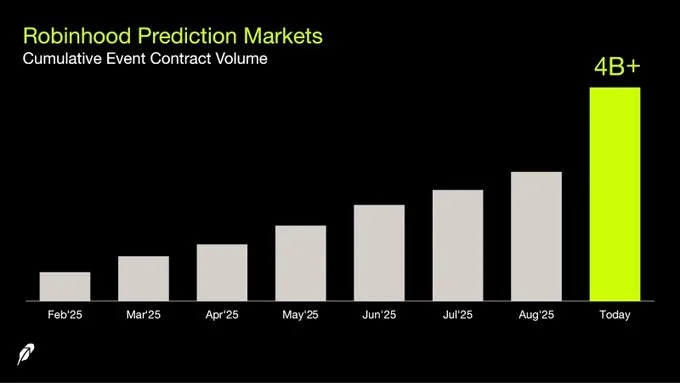Tokenization Is a Freight Train That Cannot Be Stopped, Says Robinhood CEO Tenev

- Vlad Tenev says tokenization is unstoppable and will reshape finance globally.
- Robinhood launches tokenized stocks in Europe while U.S. adoption continues to trail behind.
- Real estate tokenization and prediction markets mark Robinhood’s next global expansion push.
Robinhood’s chief executive, Vlad Tenev, believes tokenization will be the defining force in global markets. Speaking at Singapore’s Token2049, he compared the movement to a freight train moving at unstoppable speed. According to him, tokenization will eat the entire financial system, transforming how investors access assets worldwide.
I think tokenization is like a freight train,” Tenev noted. “It can’t be stopped and eventually it’s going to eat the entire financial system.
He explained that most major markets could adopt tokenization frameworks within five years. A complete shift, however, may take more than a decade. Tenev acknowledged that the U.S. will likely move more slowly than Europe and Asia due to its already effective financial infrastructure.
He noted that Americans face little urgency to overhaul a system that still serves them well. Besides, he drew an analogy to trains. Europe and Japan built high-speed systems, while the U.S. maintained slower trains because they were deemed sufficient. In the same way, he noted that the U.S. has no immediate incentive to replace a functioning financial system with tokenized rails.
Stablecoins and Stock Tokens as Global Gateways
Tenev pointed out that stablecoins represent the simplest form of tokenized assets. He observed that dollar-pegged coins are gaining traction in the U.S. due to their ability to reinforce the dollar’s global strength.
Consequently, he predicted tokenized stocks would follow the same pattern, becoming the default way for foreign investors to gain U.S. exposure. Robinhood has already launched tokenized stocks in Europe, allowing around-the-clock trading of major American equities.
Tenev positioned the move as a step toward global access, much like stablecoins provide digital access to the US dollar. In his words, stock tokens could redefine how international investors hold U.S. assets. Additionally, he said crypto and traditional finance have long operated in separate spheres. Tenev stated,
I actually think cryptocurrency and traditional finance have been living in two separate worlds for a while, but they’re going to fully merge.
In the near future, he anticipates that these two worlds will merge completely. The advantages of blockchain rails, including speed and accessibility, will erase the distinction between digital and traditional markets.
Real Estate Joins the Tokenization Wave
Robinhood now plans to expand tokenization beyond equities. Tenev revealed that real estate would be next, describing the process as straightforward. He compared it to tokenizing private company shares, such as OpenAI or SpaceX, by placing them into a structure and issuing tokens against them.
Moreover, he argued that the technical hurdles are minimal, while the real challenges lie in regulation. Europe is moving ahead, while the U.S. continues to deliberate on rules. Despite controversy, he framed real estate as the natural progression of Robinhood’s tokenization efforts, envisioning property traded as easily as a stablecoin or stock.
He acknowledged disputes, such as OpenAI’s objection to Robinhood tokenizing its private shares, yet dismissed them as signs of regulatory lag. In his outlook, once frameworks are clear, tokenization will spread across asset classes on a large scale.
Related: How Asset Tokenization Is Disrupting the Financial Industry
Prediction Markets Rising Beyond Traditional Boundaries
Besides tokenization, Robinhood is betting on prediction markets. The company launched its platform in late 2024, and it has already seen over four billion event contracts traded. These include contracts on elections, sports, culture, and technology.

Source: X
He emphasized that prediction markets are bigger than political contests. Sports events, especially football, now account for major trading volumes. Cultural and AI-related contracts are also attracting participants. Many use them for information rather than speculation, similar to news products.
However, he admitted that critics equate prediction markets with gambling. He countered that skepticism often accompanies the introduction of new financial products. In his view, prediction contracts share traits with futures, sports betting, and even media outlets.
The update comes as Robinhood prepares to expand its prediction markets overseas. The firm has already opened discussions with regulators such as the U.K.’s Financial Conduct Authority. Tenev confirmed that the company is adapting to these diverse frameworks as it pushes global expansion.




